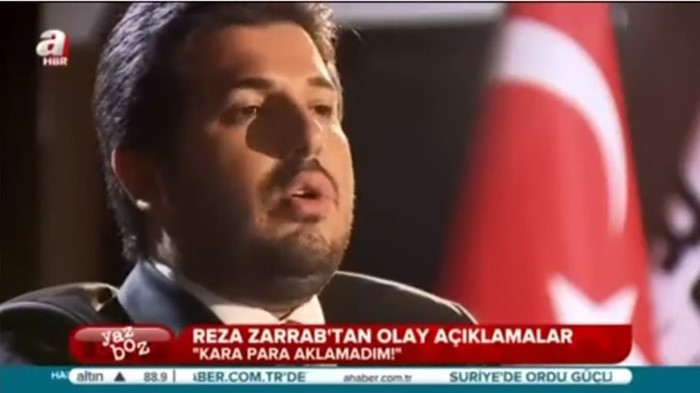As Turkish-Iranian gold trader Reza Zarrab revealed his tactics and accomplices in the Turkish government in violating US sanctions on Iran in a New York federal court, senior ruling Justice and Development Party (AKP) members targeted the court and Zarrab.
“Turkey cannot be judged by Zionist courts, by means of some jackals. Turkey is not a country and nation that can be judged by those courts,” Zelkif Kazdal, an AKP Central Decision and Executive Board (MKYK) member and deputy, tweeted on Sunday.
Burhan Kuzu, another AKP MKYK member and deputy, recently targeted Zarrab during a program on CNN Türk, saying Zarrab could have been an American agent from beginning.
Zarrab and eight other people, including Turkey’s former economy minister and three Halkbank executives, have been charged with engaging in transactions worth hundreds of millions of dollars for Iran’s government and Iranian entities from 2010 to 2015 in a scheme to evade US sanctions.
Zarrab was the prime suspect in a major corruption investigation in Turkey that became public in December 2013 and implicated the inner circle of the ruling AKP government and then-Prime Minister Recep Tayyip Erdoğan. Zarrab was alleged to have paid Cabinet-level officials and bank officers bribes to facilitate transactions benefiting Iran.
After Erdoğan cast the case as a coup attempt to overthrow his government orchestrated by his political enemies, several prosecutors were removed from the case, police were reassigned and the investigation against Zarrab was dropped in Turkey.
While the pro-Erdoğan media were declaring Zarrab a “national hero” for his “great contribution” to the Turkish economy with exports to Iran, the Iranian-born Turkish businessman was given Turkey’s top exporter award on June 21, 2015 by Economy Minister Nihat Zeybekci and Deputy Prime Minister and AKP Deputy Chairman Numan Kurtulmuş.
When Zarrab was detained in the US in March 2016, President Erdoğan tired to rescue him from prison, US media reported.
Erdoğan demanded the release of Zarrab as well as the firing of then-US Attorney Bharara during a private meeting with then-US Vice President Joe Biden on Sept. 21, 2016, devoting half the 90-minute conversation to Zarrab, David Ignatius wrote for The Washington Post on Oct. 12.
“Erdogan’s campaign to free Zarrab has been extraordinary. He demanded his release as well as the firing of Bharara in a private meeting with then-Vice President Joe Biden on Sept. 21, 2016, in which U.S. officials say half the 90-minute conversation was devoted to Zarrab,” Ignatius wrote.
“Erdogan’s wife [Emine Erdoğan] pleaded the case that night to Jill Biden [wife of Biden]. Turkey’s then-justice minister, Bekir Bozdag, visited then-Attorney General Loretta E. Lynch in October to argue that the case was ‘based on no evidence’ and that Zarrab should be released.”
Reports in October that Zarrab could have pled guilty rang alarm bells in Ankara. The Turkish government issued two diplomatic notes urging the US to notify Turkish authorities before relocating Zarrab to another facility.
President Erdoğan on Oct. 24 strongly criticized the US administration for allegedly trying to force Zarrab to give them names from the Turkish government, saying he would explain all the details.
Zarrab, who Erdoğan called a “philanthropist businessman” following a graft investigation in December 2013 and a citizen of Turkey who must be rescued from US prison, has been the focus of criticism by Erdoğan’s deputies and media after his revelations in the New York court.
The property of Zarrab and his family members was seized on Thursday as part of an investigation into espionage and providing confidential official information to a foreign government, launched by the Istanbul Public Prosecutor’s Office. According to a media report, the decision was taken as a measure to prevent Zarrab from smuggling his property outside Turkey.
Zarrab testified in federal court on Wednesday that he had bribed Turkey’s former economy minister, Mehmet Zafer Çağlayan, in a billion-dollar scheme to smuggle gold for oil in violation of US sanctions on Iran.
On Thursday Zarrab said that Turkey’s then-prime minister and current president, Recep Tayyip Erdoğan, personally authorized the involvement of Turkish banks in a scheme to evade US sanctions on Iran.
Zarrab also said for the first time on Thursday that Turkey’s Ziraat Bank and VakıfBank were involved in the scheme and that former Deputy Prime Minister Ali Babacan signed off with Erdoğan on the operation.


